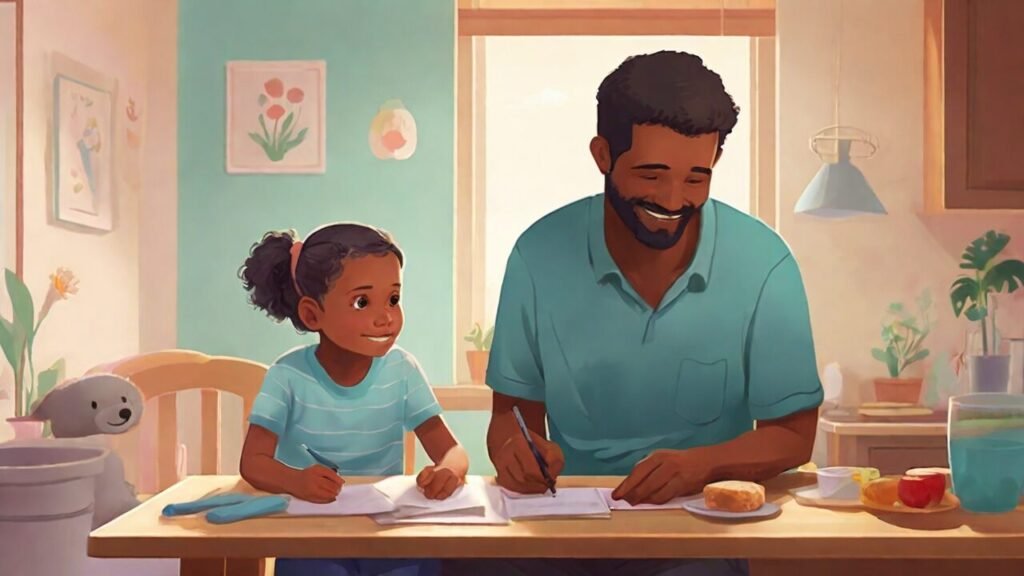The debate on parenting roles and the challenges of motherhood and fatherhood duties is ongoing. Research shows mothers worry more about their kids’ safety and mental health. They feel judged more and carry more stress and tiredness from parenting.
Mothers often see parenting as a big part of who they are. They think it’s harder than fathers do. These feelings come from both society and personal experiences, showing how gender affects parenting.
Key Takeaways
- Parenting roles involve different challenges for mothers and fathers.
- Mothers often experience more stress and emotional burden.
- Studies indicate mothers worry more about their children’s well-being.
- The perception of parenting difficulty varies between mothers and fathers.
- Societal attitudes play a significant role in the parenting experience.
Understanding Parenting Roles: Moms vs. Dads
Moms and dads have different roles in today’s society. Moms often get deeply involved in their kids’ daily lives. They watch out for their kids’ mental and physical health. Dads, on the other hand, often follow the parenting style they knew growing up. They value marriage and want their kids to have kids one day.
These differences in parenting can show us how societal pressures and gender norms affect us. Moms see parenting as a key part of who they are. This leads to the idea that moms should be very devoted to their families. Finding a good work-life balance is hard for moms because of these societal expectations.
Dads are changing their roles to be more involved in parenting. This change is also because of the need to balance work and family life. It shows how fatherhood is evolving.
| Parenting Aspect | Mothers | Fathers |
|---|---|---|
| Mental Health Vigilance | High | Moderate |
| Physical Threat Awareness | High | Variable |
| Focus on Marriage | Moderate | High |
| Identity Tied to Parenting | Strong | Growing |
| Work-Life Balance | Challenging | Improving |
The Mental Load of Motherhood
Motherhood brings more than just physical tasks. It involves a lot of emotional and psychological work, too. Mothers handle many responsibilities that stretch their limits. This unseen work can be very stressful and cause a lot of anxiety.
Emotional and Psychological Challenges
One big challenge of motherhood is the emotional work of meeting a child’s needs. Planning meals and managing schedules can be tough. Mothers worry about their children’s future, which affects their mental health. This emotional work can make parenting very stressful and anxious.
The Stress and Anxiety of Parenting
Motherhood is very demanding and can cause a lot of stress and anxiety. Many mothers find it harder than they thought it would be. Societal pressures and high expectations make things worse.
Constant judgment and the need to meet impossible standards can hurt their emotional health.
Looking at the emotional work and mental load of mothers shows how it affects their lives. Here’s a table that lists common sources of stress and anxiety in parenting:
| Source of Stress | Description |
|---|---|
| Daily Scheduling | Managing children’s activities, school, and social events |
| Emotional Support | Providing constant emotional support and guidance for children |
| Future Uncertainties | Worrying about children’s education, career, and overall well-being |
| Societal Pressures | Facing judgment and high expectations from society |
These factors add up to the mental load that mothers carry. They highlight the emotional and psychological challenges they face every day.
Fatherhood Duties and Involvement
Fatherhood has changed a lot in recent years. Traditionally, dads were seen mainly as breadwinners. Now, many dads want to be more involved in their kids’ lives. This change shows how parenting is becoming more shared.
Traditional vs. Modern Father Roles
Traditional parenting roles made dads mainly breadwinners, not caregivers. But modern fatherhood means dads are more involved. They now do things like change diapers, help with bedtime, and go to school events.
“Fatherhood isn’t just about earning a paycheck; it’s about earning a place in your child’s heart.”
Even with these changes, some dads still feel judged by their partners. There’s a belief that dads don’t help out as much at home or with childcare.
Balancing Work and Family
Balancing work and family is hard for many dads. They try to meet both work and family needs. Modern dads aim to be there for big and small moments in their kids’ lives.
It’s tough to keep up with work and parenting. But workplaces are changing. They offer paternity leave and flexible hours, helping dads be more involved in parenting.
The key to balancing work and family is support from employers, partners, and society. A forward-thinking approach to fatherhood is needed.
Is it harder to be a mom than a dad?
It’s hard to say if being a mom or a dad is tougher. It depends on personal experiences, what society expects, and how parenting tasks are shared. Moms often face big motherhood challenges, like emotional and mental strain. They feel the pressure to always be there for their kids.
Dads have important roles too, and these roles have changed over time. Today, dads are more involved in raising their kids. But moms often feel more worried and overprotective. Both parents feel a lot of stress, but moms might feel it more because of what society expects and judges them by.
Here’s a table that shows some differences:
| Aspect | Mothers | Fathers |
|---|---|---|
| Emotional Burden | Higher | Moderate |
| Societal Expectations | Strict | Flexible |
| Parenting Stress | Intense | Considerable |
| Involvement | High | Increasing |
Many moms talk about the fear of being judged and expected to do too much. This shows there’s a special kind of challenge for moms that dads don’t face as much. But both being a mom and a dad come with their own set of challenges and rewards. So, it’s hard to say which one is harder and it really depends on the person.
Gender Expectations and Societal Pressures
Gender expectations and societal pressures shape how parents act. Mothers often face more criticism than fathers. This harsh judgment changes how people see and do parenting, especially for mothers.
Societal Judgments and Double Standards
Society watches every parenting move. Women’s choices are under close scrutiny, while men get a break. This leads to a double standard where mothers are judged more than fathers. It creates an unfair world that doesn’t value both parents equally.
Gender Norms in Parenting
Gender norms make these differences worse. It’s often thought that mothers should do most of the childcare and household work. When fathers help out, they’re praised for doing what mothers usually do. This shows the pressure on mothers and the need for new views on parenting.
Childcare Responsibilities: A Comparative Analysis

Looking into childcare responsibilities, we see a clear gender division of labor. Mothers usually take on more tasks. These tasks include managing kids’ schedules, offering emotional support, and taking care of their basic needs.
On the other hand, fathers often report sharing these tasks more evenly or sometimes showing less involvement. This gap between what they say and what they actually do shows a big difference in the work mothers and fathers put into parenting.
This study shows the different parts of the gender division of labor in parenting. It shows that while some dads are taking on more, most childcare responsibilities still go to mothers. By understanding this, we can aim for a fairer sharing of the parenting workload between men and women.
Conclusion
Looking into whether moms or dads have it tougher shows us the complex world of parenting. Both moms and dads deal with their own set of challenges. Society’s views and expectations play a big part in how they experience parenting.
Mothers often get more attention and are expected to handle more emotional and practical tasks. But dads are changing too. They’re now more involved in childcare and household chores. This change is important for fairness in parenting duties and for making parenting better for everyone.
Talking about parenting roles helps us understand the unique struggles moms face. We need to keep working towards a fairer parenting approach. By doing so, families can deal with parenting’s challenges better together. This leads to a happier life for everyone in the family.
FAQ
Is it harder to be a mom than a dad in terms of parenting roles?
The debate centers on the different roles and expectations for moms and dads. Moms often worry more and handle more childcare duties. Dads struggle to balance work and family life and are seen as doing less in the home, even though they’re more involved now.
How do societal pressures impact moms and dads differently?
Societal pressures affect moms and dads in different ways. Moms are judged more and have higher expectations in childcare and at home. Dads get praised for helping out but are judged for their parenting style. They’re still seen as the main breadwinners.
What constitutes the mental load of motherhood?
Motherhood’s mental load includes emotional and psychological challenges. Moms manage their kids’ schedules, offer emotional support, and worry about their safety and future. This stress and anxiety come from high expectations and constant judgment, affecting their well-being.
How have traditional father roles evolved in modern parenting?
Traditionally, dads were seen as the main breadwinners and less involved in childcare. Now, modern dads are more hands-on with their kids. But they still struggle to balance work and family and face limits on their caregiving roles due to societal views on masculinity.
Why is parenting perceived as more stressful for mothers?
Moms are seen as more stressed because they handle more emotional and mental work. They worry more about their kids’ safety and mental health, seeing parenting as a big part of who they are. This deep involvement leads to more stress and fatigue.
How do societal judgments and double standards affect mothers and fathers?
Mothers face harsh judgments and high expectations in parenting, handling most childcare and household duties. Fathers get praised for helping out but aren’t judged as much. They’re still expected to be the main breadwinners, limiting their parenting roles.
What is the gender division of labor in childcare responsibilities?
In childcare, moms usually manage schedules, provide emotional support, and take care of basic needs. Dads say they share tasks more equally, but studies show moms still do more of the parenting work.





